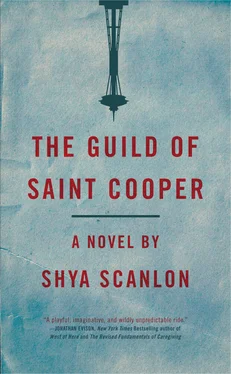“Yeah,” I said, “that’s not really what I meant.”
KENT AND I SAT on the couch, my mother in her antique rocker, rocking. The house was so thick with afternoon stillness it felt like a Jell-O mold — each of us perched in our respective chairs like a constellation of canned fruit frozen in soft green space. I said so.
“Yeah. I can see how it might seem that way to a stoned person.” Kent turned to me slowly. He’d been reading The Weekly , and he pointed to an ad in the personals. “Read that.”
Looking For The Lights?
You: a believer wanting proof. Me: an ex-Marine with experience in guerilla warfare. The Seattle Lights are coming from the woods. Let me show you. “Make Contact” for details
.
“What are you doing looking in the personals?”
Kent grabbed the paper back and glared at me.
On the radio was a story about a local man who, when flushing his toilet, got some backsplash into his mouth and, startled, sprang backward gagging, then slipped on the wet floor, fell against the toilet, and broke his neck. His girlfriend witnessed the entire thing from the bedroom, and in the interview could only say that he’d always been extremely graceful.
“I’m not stoned,” I said. “I’m buzzed.”
Kent stood. “So, wait, the guy poops with the bathroom door open?”
“Something about that story stinks,” said my mother.
I nodded. “You’ve said a mouthful.”
We were nervous. Mother’s results would be in soon. Soon as in hours, minutes. Soon as in now. All day I’d been wanting to bring it up, to ask my mother how she was feeling, but it seemed like an impossible question. Then the envelope appeared. Reappeared, rather. It was a plain white thing, a big shingle with my mother’s name scrawled across the front. It had come by messenger, so it had no addresses, neither to nor from, and without a word she’d put it, unopened, on the table beside the bouquets, and it sat there, quiet and with a curious gravity. My brother and I had stood before it, transfixed, more than once. I was finally high enough to break the spell.
“What’s with the envelope, Mom?”
Her hair was pulled back into a tight bun, and because it was so fine the shape of her skull was revealed. She looked at me kindly, firmly.
“You know, Blake, and Kent, both of you boys, you know of course that whatever happens, you’ll be taken care of. I promise you’ll both be taken care of.”
“Mom,” Kent said, “don’t say that.”
“No, I need to know that you understand. Tell me you understand.”
My mother’s face had lost the softness it had worn before, and her eyes were dark now, impassioned, almost scary. Kent’s bottom lip began to quiver.
“I understand,” he said.
“Yes,” I said. “Me too.”
“Because you two are the most important thing in the world to me. You know that, right?”
“Mom, come on.”
“Don’t Mom come on me, Blake. I’m serious.”
“I know.”
“Do you?”
“Yes.”
We sat in silence again, and it wasn’t until minutes later that I realized she hadn’t answered my question. Of course I knew how much she loved me and Kent — she frequently reminded us. So why did I feel embarrassed, somehow ashamed, by her bluntness now? Kent was sitting with his head low, staring at his hands, and I couldn’t get a read on him. The stillness had returned, but I could no longer call it thick. We were not couched in some comfortable goo, we did not seem connected by anything at all — it was absence, not presence, that described the space between us.
The gravel in the driveway announced a visitor, and we listened to the footsteps go back to the porch staircase and up the stairs. Blake appeared at the glass door. She waved, smiled, came inside.
“Am I disturbing you guys?” she said.
My mother got up to give her a hug. “No, dear, come right in. It’s good to see you!”
Kent went outside to smoke, and my mother went to the kitchen to decant a bottle of white wine. It was her new thing — leaving white wine out after opening it, letting it warm. “The tyranny of ice!” she’d exclaim. Blake came and sat with me. The afternoon sun had crept from the windowsill to the couch’s high plush back, and from there it would cascade down to the seat and run us off.
“What’s going on?” she asked me quietly. “Should I come back?”
It seemed like she probably should. I tried to picture my mother being told she had cancer. Blake was not in that picture.
“Dale wants to talk to you,” she said.
“Blake.”
“He thinks you may be on to something with your interpretation of the word ‘novel.’”
“Blake, listen.”
“I know it’s weird, but he takes his dreams very seriously.”
“Blake, I think you should—”
The phone rang.
Still standing in the kitchen, my mother drank the full glass of wine she’d poured for herself, then another she’d poured for Blake, and stepped forward to answer it. Blake stood and began to move toward the door, but stopped short when my mother held up her hand. Blake looked at me. The options were to stay and witness the havoc caused by the call or to leave before she got the message, therefore adding humiliation to the mix. She sat back down. My mother spoke very little, saying her soft yeses and nos, nodding. The color had left her face and her hand was on her hip, her left leg bent at the knee, her feet bare. This summer, I thought, would be a summer of little trips. Little trips to the hospital for treatment. Little trips to the lab. Little trips to the pharmacy and to counseling. Little trips to the bathroom to vomit. Little trips to bed. And if she beat the cancer? There would be a reprieve from these trips — a temporary reprieve, and then they would resume. And who would take her? Who would hold her hand and hold her hair and who would save the receipts? The sun began to bathe Blake and me with light, heat, and I thought of my father in the cold recesses of Alaska, waiting out the interminable storm.
I leaned in close to Blake, and she put her arm around my shoulder. “Okay,” I said. “I’m in.”
My mother put the phone down and slowly walked to the table, picked up the white envelope, and began to tear. As she tore she began to weep. She wept and tore and grew angry, tearing more violently, tearing pieces into smaller pieces, and Blake began to get up but I held her there, pinned her to the couch, in the sun, so that my mother could have more time to tear and to weep.
Kent came back inside, went straight over and took her in his arms. They stood there for a moment, my mother still gripping white scraps in both hands, wrapped in my brother’s arms, my brother whispering “Shh, shh, shh” and gently rocking side to side. I joined them, putting my arms around them both. Blake’s face was wet from silent crying, and she stared at our small union as it tipped to one side and then the other, my brother’s weight shifting us all.
“I’m so sorry, Mom,” I said.
She shook her head.
“We’ll take care of you,” I said.
“No, no.” She shrugged us off and stood facing us. “No, it’s okay.”
“What do you mean?”
“It’s benign.”
My brother acted first. He whooped loudly and grabbed her around the waist, then lifted her into the air and spun. My mother screamed and started laughing, beseeching him to put her down. Blake came and stood with me, and we smiled as Kent refused her request, spinning and spinning, shouting until my mother’s screams turned back into tears. He returned her to the floor, and because she looked unsteady I pulled out a chair so she could sit.
Читать дальше












